 |
| Billionaire John Gage (Robert Redford) develops an intense interest in married real estate agent Diana (Demi Moore). |
Release Date: Apr. 7, 1993. Running Time: 118 minutes. Screenplay: Amy Holden Jones. Based on the novel by: Jack Engelhard. Producer: Sherry Lansing. Director: Adrian Lyne.
THE PLOT:
Diana Murphy (Demi Moore) and her husband David (Woody Harrelson) are enjoying an idyllic married life. She is a real estate agent, and he is an architect, designing their dream home on their California property.
Then a recession hits. Home sales dry up for Diana, and David is laid off by his firm. After missing multiple mortgage payments, the two are in danger of losing their home. In desperation, they decide to make an overnight trip to Las Vegas to win the money they need to pay off the bank.
The results are predictable, and soon they are left with nothing. But Diana catches the eye of billionaire John Gage (Robert Redford), and he invites her and her husband to his suite for drinks. After some banter in which Diana says there are limits to what money can buy, Gage decides to test her statement. He offers the desperate couple $1 million for a single night with her.
David and Diana promise each other that they will never speak of this again. But after the deal is closed, David finds that he cannot forget. With Gage finding ways to intrude into her life, and David seeming determined to drive her away out of jealousy, Diana begins to wonder whether her marriage is as "invincible" as she and her husband had always believed...
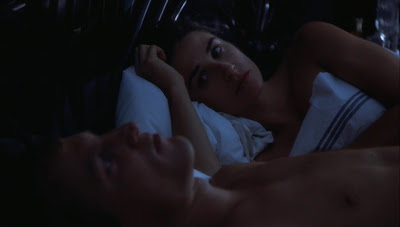 |
| David and Diana can't stop thinking about Gage's offer. |
CHARACTERS:
John Gage: The key character scene for Gage sees him recalling a woman from his past, someone he only saw once and whose name he never knew because he was too hesitant to ask. This explains much about his motivations. From moments such as this, when he failed to get what he wanted only because he didn't try, he learned to be relentless when pursuing his goals - and it's with that relentlessness that he pursues Diana. That she's married doesn't matter to him; he wants her and, if it's within his power (and it usually is), he will have her.
A notable thing about this scene is Robert Redford's absolute control of his own acting. He doesn't strongly emote, he doesn't gesture. He fully conveys how much this past moment means to Gage while drawing a vivid mental image in the audience's mind, all through the tiniest of variances in voice and expression. It's his entire performance boiled down to a single, very good scene: He does exactly what is necessary to draw focus and convey his character, and not one thing more - and that very restraint makes him a stronger presence on screen.
Diana: Diana is not a particularly well-written character, but Demi Moore makes her work better than she should, largely by emphasizing moments of strength. When Gage makes his offer, Diana waits for her husband to say something; when she speaks up, telling Gage to go to hell, her voice carries a mix of anger at the billionaire and disappointment in her husband. She's anxious once the contract is signed, wondering exactly what she's expected to do; but by the time Gage spirits her away to his yacht, she has found her backbone and snaps at him when he makes a dig at David. These defiant moments help to sell her as someone Gage would actually be interested in. It also makes her moments of vulnerability, notably a breakdown after an argument with David, register more strongly.
David: Woody Harrelson won the Razzie for Worst Supporting Actor - and as much as I usually enjoy his work, I'm afraid I can't argue with the dishonor. He had yet to find himself as a dramatic actor, with his background mainly being in comedies, and he seems a bit lost at sea. In contrast to Redford's understated control, Harrelson overacts every emotion in a way that recalls the "Oscar Clip" gag in Wayne's World. He isn't helped by being stuck with the most inconsistently written of the three main roles, which is made even worse by the final half hour's insistence on bolting through his arc. In effect, all of David's character growth is crammed into ten minutes of screen time.
Shackleford: Gage's loyal manservant. In one of arguably too many nods to Redford's earlier role in The Great Gatsby, Gage speaks of Shackelford's mysterious past and says that he once killed a man, delivering the line in a way that keeps ambiguous whether he's serious or joking. And on the page... that's about it for Shackelford as a character. The late Seymour Cassel makes him an engaging presence largely through small bits of background business: The way he dances by himself while Gage and the young couple speak; the glances he exchanges with Gage; the smile he gives when he sees David's display of torn-and-taped up photographs. We never really know what he's thinking, but we can sense an inner life that we aren't privy to - something that I credit entirely to Cassel.
Jeremy: As David and Diana's friend and lawyer, Oliver Platt seems to be in a different movie than everyone else. Frankly, I'd rather watch his movie. When David calls him to finalize the deal with Gage, Jeremy is outraged, demanding to know how they could agree to such a thing... without first consulting him. "Never negotiate without your lawyer, never! For a woman like Diana, I could have gotten you two million!" He's so unapologetic in his greed that it's actually a bit charming, particularly when his friendship with the couple remains evident. He seems genuinely confused when the two separate, saying to Diana: "He loves you, you love him... This is a deal even I couldn't screw up."
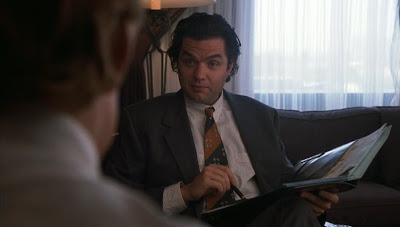 |
| Oliver Platt as the couple's friend and lawyer, who merrily steals every second of screentime he gets. |
"SAY SOMETHING NICE":
Director Adrian Lyne was always good at lending his films visual polish. He uses physical spaces to particularly strong effect. David and Diana's house is small, certainly compared to Gage's mansion, but it's filled with little things to show that people live there: a garden, unfolded laundry, items that decorate the walls. By contrast, Gage's hotel room and mansion are immaculate but cold. Diana even tells him that he needs furniture and maybe a dog to make it feel less like a showpiece and more like a home.
The film certainly has dumb moments ("Vegas" should never be your plan to make money unless you're going to work there), but there are genuinely good scenes. The scene in which Gage makes his proposal is carefully scripted to reveal the dynamics of all three characters, with Gage making the proposal in part to prove Diana wrong when she claims that "you can't buy people," and then pressing it after he senses David's weakness.
LOST IN ADAPTATION:
This is listed as being based on a novel by Jack Engelhard. In reality, the filmmakers just bought the general concept. In the novel, Josh (the "David" character) is a Jewish man married to Joan, a beautiful, blonde WASP. The rich man is Ibrahim, an Arab sheikh, and he is considerably more unscrupulous than Robert Redford's polite billionaire. Ibraham's interest in Josh's wife is driven less by emotion than by a desire to secure a trophy.
Josh is very clearly the main character, while Joan is the least characterized of the three principals - the exact opposite of the movie, where Diana is the lead and David receives the least characterization. The book's narrative folds in tensions involving race, culture, and history. There is also a strong thriller element, complete with a surprise double-cross.
All of which is to say... The movie tells a completely different story in a completely different way. The only things ultimately retained were the million dollar premise and the title.
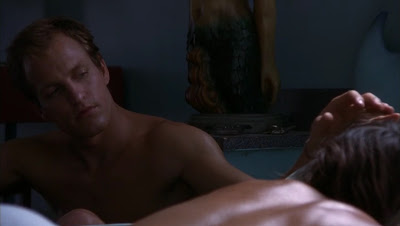 |
| David watches Diane sleep. I think it's meant to be romantic, but it comes across as really creepy. |
AN EPIPHANY THAT ISN'T:
"I thought he was the better man. I know now he's not - He's just got more money."
Back to the movie: David's insecurity arc ends when he realizes that Gage really isn't better than him. That's nice... except that the entire preceding film seems to contradict this!
Questionnaires of women attracted to older men tend to find that such attraction comes down to financial stability and emotional maturity. A contrast between Indecent Proposal's John Gage and David Murphy provides what could practically be a case study in this. Gage is calm, confident, and focused. He is absolutely secure in his own skin. Even when he's acting as the villain of the piece (which he is), he makes no excuses for his choices and does not try to attach blame to anyone else. By contrast, David loudly and almost violently blames everyone else - particularly Diana - for his misfortunes.
But fine: David has to go through his arc and grow, so that he can actually be worthy of his wife. The problem? First, all of his growth comes in a ten-minute burst near the end, with him going from drunkenly ranting about cuckoo birds to calmly teaching a class of architecture students with almost no transition. Then he swoops in to tell Diana the great epiphany he had.
For your edification, I will quote his realization in full:
"I think the mistake I made in Vegas was thinking that I could forget what we did. I thought we were invincible. But now I know that the things that people in love do to each other, they remember. And if they stay together, it's not because they forget, it's because they forgive."
...That's it? His grand revelation is the existence of frickin' memory? This is his breakthrough. He isn't even owning any responsibility for what happened, even in this supposedly mature final statement.
I want to cry out to Diana to stay with Gage. Not because of the money (though yes, it's a nice perk) - but because Gage is an actual adult. With David, I'd bet good money that she'd end up playing "mommy" for life.
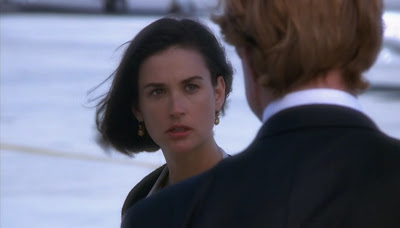 |
| By emphasizing Diane's strongest moments, Demi Moore brings much more to the character than is on the page. |
OTHER MUSINGS:
Sleazy premise aside, Indecent Proposal is a slickly produced and ultimately fairly mild soap opera. It's not a good movie by any stretch, but I'd rank it as being far from Worst Picture material.
It doesn't bore me the way Shining Through did. This movie treads shallow waters, less concerned with story or character than with how sexy Demi Moore looks rolling half-naked on a cash-covered mattress, or with the way fiftyish Robert Redford wears a suit in a manner that would make confident professionals twenty years his junior feel like gangly teens. This is superficial eye candy, which has its place. I enjoyed it well enough on a scene-by-scene basis. The main problem? I never felt at all invested.
We're introduced to David and Diana via drippy voice overs, flashbacks, and a score that sounds like it would better fit a television soap opera than a major theatrical feature. Then we get a painfully artificial, heavily choreographed sex scene. This is about five minutes in; we haven't even had a chance to get to know the couple yet; so there's no chance of this carrying any emotional meaning for the viewer. Given that it ends up being the movie's only sex scene, it honestly plays as if it was tacked on just to make sure post-Basic Instinct viewers didn't feel cheated.
Diana ends up working as a character, thanks to a carefully thought-out performance by Demi Moore. As for David... Well, most of what I've already written should tell you how badly I think his characterization fails. He's already dull, weak, and whiny at the midpoint. Then comes the moment that extinguishes any hint of sympathy I might have felt for him.
After the night with Gage, the couple returns home to find that complications have arisen with their house. Diana tries to calmly discuss this - but the instant she mentions Gage's name, David grabs a wine bottle and throws it against the wall, shattering it.
I'm pretty sure that I'm meant to feel David's emotional torment. Instead, I'm mentally urging Diana to run as fast as she can. Once things are being thrown and broken, the next escalation tends to be to physical violence, and David's demeanor indicates that he's capable of it. I'm positive I'm not meant to even have that thought. It's just a trailer-ready moment of melodrama that ends up being spectacularly misjudged. But it not only takes me out of the movie; for me, it turns a supposedly sympathetic character into... well, the opposite of that.
Meaning that the emotional core of the film - the couple - fails to work for me on any level.
 |
| Gage takes Diane to his yacht to consummate their agreement. |
THE OTHER NOMINEES:
This was the year after Paul Verhoeven's Basic Instinct became a monster hit, and a number of movies attempted to replicate it... almost all of them without success. Body of Evidence was producer Dino de Laurentiis's go, with Willem Dafoe defending Madonna from murder charges when not getting intimate with her on broken glass. In a word: Ouch. The sex is unappealing, Madonna's acting is awful, Dafoe's - amazingly - is just as bad, and the thriller plot is woeful.
Basic Instinct scribe Joe Eszterhas and star Sharon Stone tried to strike "erotic thriller" gold twice with Sliver. Stone isn't bad, but she has no chemistry with co-star William Baldwin. At least their big sex scene is free of sharp objects even if, as staged, it looks more uncomfortable than arousing. The biggest problem is the final Act, which was entirely rewritten and reshot in response to test audiences. The last half hour is incoherent as a result - hardly a surprise, when the entire rest of the movie was building up to a completely different murderer!
Sylvester Stallone's Cliffhanger is thankfully not an erotic thriller. Instead, it's comic book style silliness, with Stallone running shirtless on a snow-covered mountaintop while foiling the dastardly plans of South African baddie John Lithgow, whose accent is either the worst or best thing about the film. It's terrible, but it's also a lot of fun when viewed in the right frame of mind.
The final Worst Picture nominee was The Last Action Hero, in which a young Arnold Schwarzenegger fan is magically transported into a Schwarzenegger movie. I remember really liking this one. That said, I haven't seen it since the 1990s, so it's possible that my memory is playing tricks on me.
Of this set, Body of Evidence and Sliver strike me as the most appropriate Worst Picture candidates. Indecent Proposal may be shallow and a bit stupid, but it's enjoyable enough on its own terms. I can't say the same about those two would-be erotic thrillers.
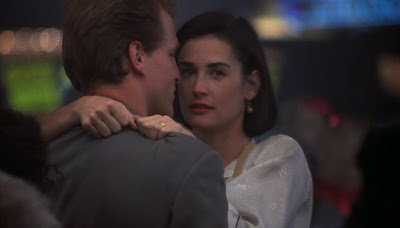 |
| While dancing with David, Diana is distracted by Gage. |
OVERALL:
Indecent Proposal is shallow. Its big moral question is so laughable that it was mocked by projects ranging from Kingpin (a much better Woody Harrelson vehicle) and the sitcom Mad About You. It's too superficial to get invested in, and it undermines whatever connection we might have to the couple by sabotaging the husband's character halfway through. Even so, it's passably entertaining. Robert Redford and Demi Moore both give carefully controlled performances, Oliver Platt steals every scene he's in, and there are several individual scenes that work quite well.
For all of its obvious failings, audiences of the time lapped up Indecent Proposal, and there's still a fair amount to enjoy. Just... maybe fast forward through any of Woody Harrelson's solo scenes.
Rating: Raspberry.
Worst Picture - 1992: Shining Through
Worst Picture - 1994: Color of Night
Review Index
To receive new review updates, follow me:
On BlueSky:
On Threads:


No comments:
Post a Comment